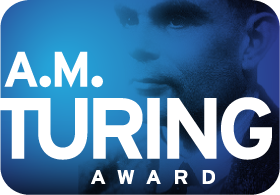
A.M. TURING AWARD WINNERS BY...
Marvin Minsky

United States – 1969
Short Annotated Bibliography
- Minsky, Marvin, Computation: Finite and Infinite Machines, Prentice-Hall, 1967. A standard textbook in Computer Science for many years.
- Minsky, Marvin, Semantic Information Processing, MIT Press, 1968. A collection that has had a strong influence on modern computational linguistics.
- Minsky, Marvin and Seymour A. Papert, Perceptrons, MIT Press, 1969 (Enlarged edition, 1988). A seminal work that developed the modem theory of computational geometry and established fundamental limitations of loop-free connectionist learning machines.
- Minsky, Marvin, The Society of Mind, Simon and Schuster, 1987. The first comprehensive description of the Society of Mind theory of intellectual structure and development.
- Minsky, Marvin and Harrison, Harry, The Turing Option, Warner Books, New York, 1992. A science fiction thriller about the construction of a super intelligent robot in the year 2023.
- Minsky, Marvin, The Emotion Machine, Simon and Schuster, 2006. The sequel to The Society of Mind that examines the nature of intelligence and finds many ways of thinking, many layers of thinking, many meanings to consciousness, and many ways of modeling self.




























 THE A.M. TURING AWARD
THE A.M. TURING AWARD